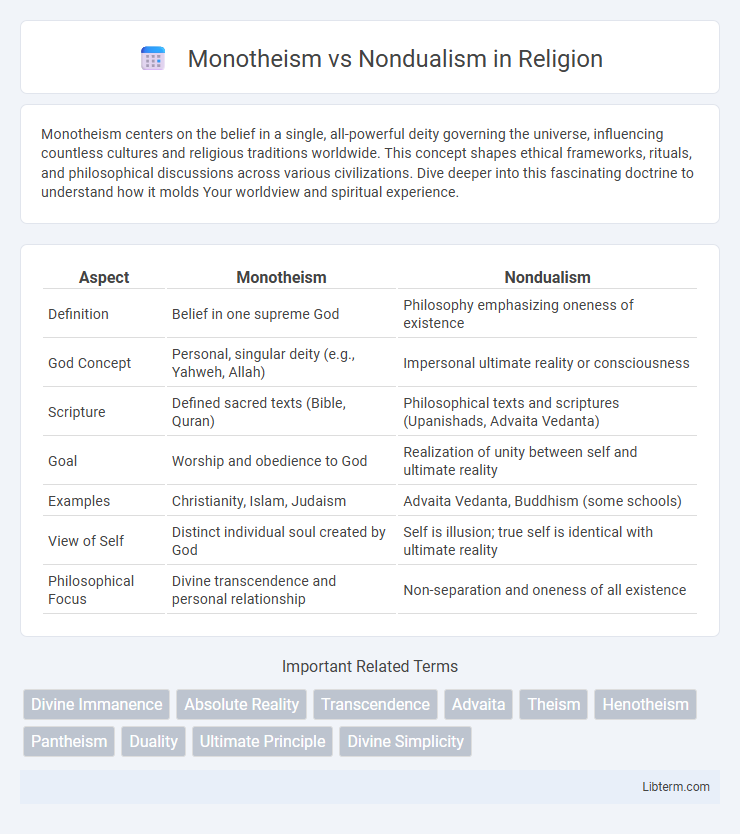Monotheism centers on the belief in a single, all-powerful deity governing the universe, influencing countless cultures and religious traditions worldwide. This concept shapes ethical frameworks, rituals, and philosophical discussions across various civilizations. Dive deeper into this fascinating doctrine to understand how it molds Your worldview and spiritual experience.
Table of Comparison
| Aspect | Monotheism | Nondualism |
|---|---|---|
| Definition | Belief in one supreme God | Philosophy emphasizing oneness of existence |
| God Concept | Personal, singular deity (e.g., Yahweh, Allah) | Impersonal ultimate reality or consciousness |
| Scripture | Defined sacred texts (Bible, Quran) | Philosophical texts and scriptures (Upanishads, Advaita Vedanta) |
| Goal | Worship and obedience to God | Realization of unity between self and ultimate reality |
| Examples | Christianity, Islam, Judaism | Advaita Vedanta, Buddhism (some schools) |
| View of Self | Distinct individual soul created by God | Self is illusion; true self is identical with ultimate reality |
| Philosophical Focus | Divine transcendence and personal relationship | Non-separation and oneness of all existence |
Understanding Monotheism: Core Beliefs and Traditions
Monotheism centers on the belief in a single, all-powerful deity who is the creator and sustainer of the universe, as seen in traditions like Christianity, Islam, and Judaism. Core beliefs emphasize the unity, omnipotence, omniscience, and benevolence of God, along with moral laws revealed through sacred texts such as the Bible, Quran, and Torah. Rituals and worship in monotheistic traditions often involve prayer, ethical living, and community practices aimed at fostering a personal relationship with the singular divine being.
Nondualism Explained: Key Concepts and Origins
Nondualism, rooted in ancient Eastern philosophies such as Advaita Vedanta and Zen Buddhism, emphasizes the fundamental oneness of reality, asserting that the apparent dualities of subject and object, self and other, are illusory. This concept reveals that individual consciousness and the universal essence are not separate entities but aspects of a singular, undivided existence. Key principles include the dissolution of ego-bound identity and the realization of an all-encompassing unity beyond sensory illusions.
Historical Development of Monotheistic Thought
Monotheistic thought historically developed from early Mesopotamian and Egyptian religious traditions, evolving significantly through ancient Israelite religion with the worship of Yahweh as the sole deity. The codification of monotheism reached a pivotal stage during the Babylonian Exile, solidifying the theological emphasis on a singular, omnipotent God in Judaic texts. This foundation influenced later Abrahamic religions, including Christianity and Islam, which expanded and diversified monotheistic concepts while interacting with nondualistic philosophies in various cultural contexts.
Philosophical Foundations of Nondualism
Nondualism is rooted in the philosophical foundation that reality is ultimately indivisible and transcends all dualities, including subject-object and self-other distinctions, as emphasized in Advaita Vedanta and certain Buddhist traditions. It challenges the monotheistic framework by positing that the ultimate truth is a singular, non-personal absolute rather than a separate, personal deity. Key concepts such as Brahman in Hinduism and Sunyata in Buddhism highlight the metaphysical unity and interconnectedness central to nondual philosophy.
Comparing Divine Reality: God vs. Ultimate Unity
Monotheism centers on the concept of a singular, personal God who exists as a distinct entity with a will, often characterized by omnipotence, omniscience, and benevolence. Nondualism, especially in Advaita Vedanta and similar traditions, emphasizes Ultimate Unity, where the divine reality is an impersonal, indivisible oneness transcending dualistic distinctions like self and other or creator and creation. The fundamental contrast lies in monotheism's portrayal of God as a transcendent, separate being, whereas nondualism reveals the divine as inherent, formless, and identical with the essence of all existence.
Pathways to Liberation: Salvation and Enlightenment
Monotheism emphasizes salvation through faith, divine grace, and obedience to a singular God, leading to eternal union or heaven. Nondualism advocates for enlightenment by realizing the intrinsic unity of self and ultimate reality, dissolving dualistic perceptions. Both pathways aim for liberation but diverge in their metaphysical frameworks and spiritual practices.
The Role of the Self: Individuality vs. Oneness
Monotheism emphasizes the individuality of the self as a distinct creation with a personal relationship to a singular God, highlighting personal identity and moral responsibility. Nondualism, in contrast, dissolves the boundaries of individual identity, asserting that the true self is inseparable from the ultimate reality or oneness that underlies all existence. This distinction shapes differing spiritual practices and philosophies, where monotheism fosters self-awareness within divine context, and nondualism promotes transcendence of the ego to realize unity.
Ethics and Morality in Monotheism and Nondualism
Monotheism grounds ethics and morality in the commands and character of a singular, transcendent God, emphasizing universal moral laws and divine accountability. Nondualism, by contrast, views ethical behavior as arising from the recognition of the interconnectedness and unity of all existence, where moral actions promote harmony and the dissolution of dualistic separations. The monotheistic framework prioritizes obedience to divine commandments, while nondualism encourages self-realization and compassion as paths to ethical living.
Mystical Experiences: Contrasts and Overlaps
Monotheism anchors mystical experiences in the relationship between a singular, personal deity and the individual, often emphasizing prayerful communion or divine revelation. Nondualism presents mystical experiences as the realization of an underlying unity beyond individual self and dualistic distinctions, highlighting direct insight into the oneness of existence. Both frameworks reveal profound spiritual states but differ in conceptualizing the divine--personal and transcendent in monotheism versus impersonal and immanent in nondualism--while sometimes overlapping in the experience of ultimate reality beyond ordinary perception.
Monotheism and Nondualism in Contemporary Spirituality
Monotheism centers on the belief in a single, personal God who is distinct from creation, shaping contemporary spirituality through organized religious practices and moral frameworks. Nondualism emphasizes the unity of all existence, transcending the illusion of separation and promoting inner realization and spiritual awakening in modern meditation and mindfulness movements. The contrast between monotheism's divine transcendence and nondualism's experiential oneness influences diverse approaches to spiritual identity and ultimate reality today.
Monotheism Infographic

 libterm.com
libterm.com